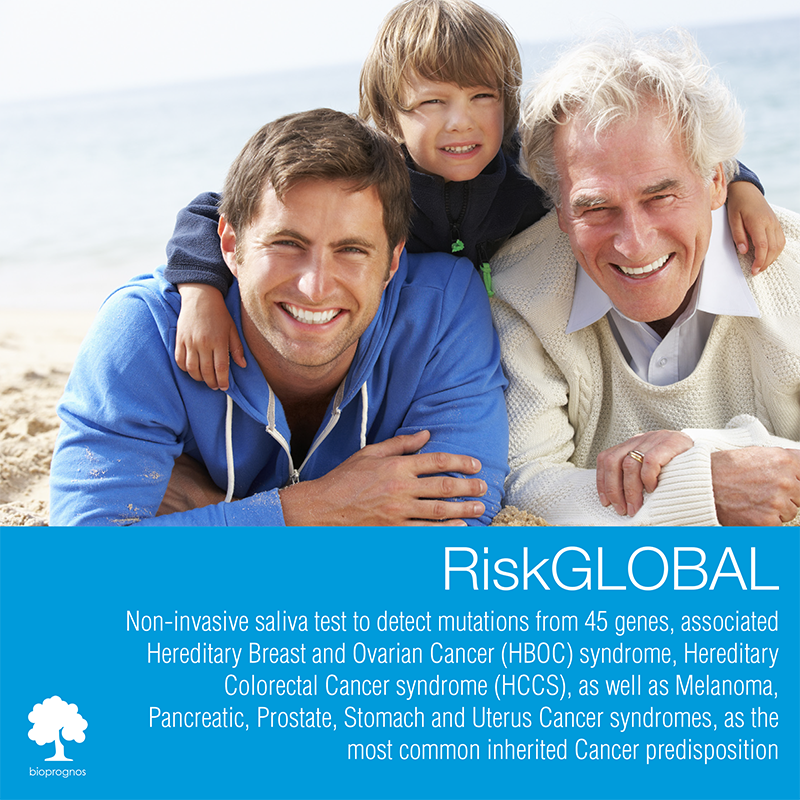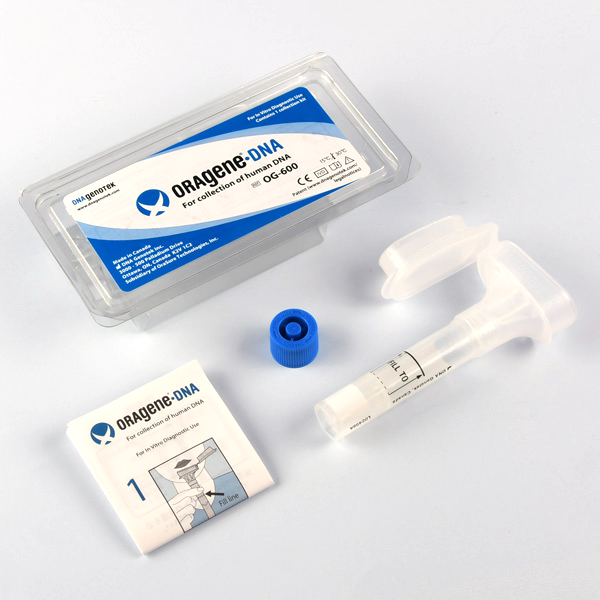RiskGLOBAL
Overview
RiskGLOBAL is our test that check for 45 gene mutations related to hereditary Breast, Colorectal, Duodenal, Gastrointestinal, Genitourinary, Leukemias, Ovarian, Melanoma, Pancreatic, Prostate, Thyroid, Sarcoma, Small Intestine, Stomach and Uterus Cancer.
Thanks that, RiskGLOBAL is the more complete test for high-risk men and women, including those with a family history of all cancers mentioned above.

Click here to download the brochure in PDF format.
RiskGLOBAL Basis
RiskGLOBAL captures and direct sequences all the genomic regions for 45 genes, using modern Next Generation Sequencing (NGS) techniques in combination with more classical approaches of molecular genetics.
Through RiskGLOBAL, it is possible to detect point mutations in exons, deep intronic regions (up to 45bb) and in untranslated regulatory regions of the genes, as well as some structural variants.
The whole list of genes that RiskGLOBAL check is:
- APC, ATM, BARD1, BMPR1A, BRCA1, BRCA2, BRIP1, CDH1, CDK4, CDKN2A, CHEK2, EPCAM, FH, FLCN, MAX, MEN1, MET, MITF, MLH1, MRE11A, MSH2, MSH6, MUTYH, NBN, NF1, PALB2, PMS2, POLD1, POLE, PTEN, RAD50, RAD51C, RAD51D, RET, SDHAF2, SDHB, SDHC, SDHD, SMAD4, STK11, TMEM127, TP53, TSC1, TSC2 and VHL.
Indications for use for RiskGLOBAL
RiskGLOBAL is indicated to detect 45 gene mutations related to hereditary Breast, Colorectal, Duodenal, Gastrointestinal, Genitourinary, Leukemias, Ovarian, Melanoma, Pancreatic, Prostate, Thyroid, Sarcoma, Small Intestine, Stomach and Uterus Cancer for complete study.
Moreover, unlike BIOPROGNOS’ tests to help in diagnosis (such as OncoBREAST Dx, OncoLUNG Dx, OncoOVARIAN Dx, OncoPROSTATE Dx or OncoCUP Dx), RiskGLOBAL does not need a receipt or prescription.
How to get tested
Once the purchase process is completed through this web page, you will receive a Saliva Kit at your home to take a sample of your saliva.

Once you receive our Saliva Kit, please just follow the instructions included and send us again with already postage paid.
After about 20 business days (depending on your location), RiskGLOBAL results will be sent by email to the email provided during the purchase process.
References
- Howlader N, Noone AM, Krapcho M, et al. (eds). SEER Cancer Statistics Review, 1975-2014, National Cancer Institute. Bethesda, MD, https://seer.cancer.gov/csr/1975_2014/, based on November 2016 SEER data submission, posted to the SEER web site, April 2017.
- Kuchenbaecker KB, Hopper JL, Barnes DR, et al. Risks of breast, ovarian, and contralateral breast cancer for BRCA1 and BRCA2 mutation carriers. JAMA 2017; 317(23):2402-2416.
- Brose MS, Rebbeck TR, Calzone KA, et al. Cancer risk estimates for BRCA1 mutation carriers identified in a risk evaluation program. Journal of the National Cancer Institute 2002; 94(18):1365–1372.
- Finch A, Beiner M, Lubinski J, et al. Salpingo-oophorectomy and the risk of ovarian, fallopian tube, and peritoneal cancers in women with a BRCA1 or BRCA2 mutation. JAMA 2006; 296(2):185–192.
- Levine DA, Argenta PA, Yee CJ, et al. Fallopian tube and primary peritoneal carcinomas associated with BRCA mutations. Journal of Clinical Oncology 2003; 21(22):4222–4227.
- Tai YC, Domchek S, Parmigiani G, Chen S. Breast cancer risk among male BRCA1 and BRCA2 mutation carriers. Journal of the National Cancer Institute 2007; 99(23):1811–1814
- Levy-Lahad E, Friedman E. Cancer risks among BRCA1 and BRCA2 mutation carriers. British Journal of Cancer 2007; 96(1):11–15.
- Ferrone CR, Levine DA, Tang LH, et al. BRCA germline mutations in Jewish patients with pancreatic adenocarcinoma. Journal of Clinical Oncology 2009; 27(3):433–438.
- Cavanagh H, Rogers KM. The role of BRCA1 and BRCA2 mutations in prostate, pancreatic and stomach cancers. Hereditary Cancer in Clinical Practice 2015; 13(1):16.
- Howlett NG, Taniguchi T, Olson S, et al. Biallelic inactivation of BRCA2 in Fanconi anemia. Science 2002; 297(5581):606–609.
- Alter BP. Fanconi anemia and the development of leukemia. Best practice & research. Clinical Haematology 2014; 27(3-4):214-21.
- Sawyer SL, Tian L, Kähkönen M, et al. Biallelic mutations in BRCA1 cause a new Fanconi anemia subtype. Cancer Discovery 2015; 5(2):135-142.
- Hall MJ, Reid JE, Burbidge LA, et al. BRCA1 and BRCA2 mutations in women of different ethnicities undergoing testing for hereditary breast-ovarian cancer. Cancer 2009; 115(10):2222-2233.
- Kurian AW. BRCA1 and BRCA2 mutations across race and ethnicity: distribution and clinical implications. Current Opinion in Obstetrics & Gynecology 2010; 22(1):72-78.
- U.S. Preventive Services Task Force. Risk Assessment, Genetic Counseling, and Genetic Testing for BRCARelated Cancer in Women: Clinical Summary of USPSTF Recommendation. AHRQ Publication No. 12-05164-EF-3. December 2013.
- Peshkin BN, DeMarco TA, Brogan BM, Lerman C, Isaacs C. BRCA1/2 testing: Complex themes in result interpretation. Journal of Clinical Oncology 2001; 19(9):2555–2565.
- Burke W, Daly M, Garber J, et al. Recommendations for follow-up care of individuals with an inherited predisposition to cancer. II. BRCA1 and BRCA2. Cancer Genetics Studies Consortium. JAMA 1997; 277(12):997–1003.
- Sardanelli F, Podo F, Santoro F, et al. Multicenter surveillance of women at high genetic breast cancer risk using mammography, ultrasonography, and contrast-enhanced magnetic resonance imaging (the high breast cancer risk italian 1 study): final results. Investigative Radiology 2011; 46(2):94-105.
- Lord SJ, Lei W, Craft P, et al. A systematic review of the effectiveness of magnetic resonance imaging (MRI) as an addition to mammography and ultrasound in screening young women at high risk of breast cancer. European Journal of Cancer 2007; 43(13):1905-1917.
- Obdeijn IM, Loo CE, Rijnsburger AJ, et al. Assessment of false-negative cases of breast MR imaging in women with a familial or genetic predisposition. Breast Cancer Research and Treatment 2010; 119(2):399–407.
- Evans DG, Gaarenstroom KN, Stirling D, et al. Screening for familial ovarian cancer: Poor survival of BRCA1/2 related cancers. Journal of Medical Genetics 2009; 46(9):593–597.
- Domchek SM, Friebel TM, Singer CF, et al. Association of risk-reducing surgery in BRCA1 or BRCA2 mutation carriers with cancer risk and mortality. JAMA 2010; 304(9):967–975.
- Finch AP, Lubinski J, Møller P, et al. Impact of oophorectomy on cancer incidence and mortality in women with a BRCA1 or BRCA2 mutation. Journal of Clinical Oncology 2014; 32(15):1547-1553.
- King MC, Wieand S, Hale K, et al. Tamoxifen and breast cancer incidence among women with inherited mutations in BRCA1 and BRCA2: National Surgical Adjuvant Breast and Bowel Project (NSABP–P1) Breast Cancer Prevention Trial. JAMA 2001; 286(18):2251–2256.
- Phillips KA, Milne RL, Rookus MA, et al. Tamoxifen and risk of contralateral breast cancer for BRCA1 & BRCA2 mutation carriers. Journal of Cli. Oncology 2013; 31(25):3091-3099.
- Gronwald J, Tung N, Foulkes WD, et al. Tamoxifen and contralateral breast cancer in BRCA1 and BRCA2 carriers: An update. Int. Journal of Cancer 2006; 118(9):2281–2284.
- McLaughlin JR, Risch HA, Lubinski J, et al. Reproductive risk factors for ovarian cancer in carriers of BRCA1 or BRCA2 mutations: A case-control study. Lancet Oncology 2007; 8(1):26–34.
- Metcalfe K, Lynch HT, Ghadirian P. Risk of ipsilateral breast cancer in BRCA1 and BRCA2 mutation carriers. Breast Cancer Research and Treatment 2011; 127(1):287-296.
- Campeau PM, Foulkes WD, Tischkowitz MD. Hereditary breast cancer: New genetic developments, new therapeutic avenues. Human Genetics 2008; 124(1):31–42.
- Walsh T, Casadei S, Coats KH, et al. Spectrum of mutations in BRCA1, BRCA2, CHEK2, and TP53 in families at high risk of breast cancer. JAMA 2006; 295(12):1379–1388.
- Antoniou AC, Casadei S, Heikkinen T, et al. Breast-cancer risk in families with mutations in PALB2. New England Journal of Medicine 2014; 371(6):497–506.
- Kurian AW, Hughes E, Handorf EA, et al. Breast and ovarian cancer penetrance estimates derived from germline multiple-gene sequencing results in women. JCO Precision Oncology 2017; first published online June 27, 2017. DOI: 1200/PO.16.00066.

